
Wisteria is a genus of flowering plants in the legume family, Fabaceae (Leguminosae). The genus includes four species of woody twining vines that are native to China, Japan, Korea, Vietnam, southern Canada, the Eastern United States, and north of Iran. They were later introduced to France, Germany and various other countries in Europe. Some species are popular ornamental plants. The genus name is also used as the English name, and may then be spelt 'wistaria'. In some countries in Western and Central Europe, Wisteria is also known by a variant spelling of the genus in which species were formerly placed, Glycine. Examples include the French glycines, the German Glyzinie, and the Polish glicynia.

Myrciaria floribunda, commonly known as cambuizeiro, guavaberry or rumberry, is a species of plant in the family Myrtaceae. It can be found across South and Central America and the West Indies in dry or moist coastal woodlands, up to 300 metres above sea level. The guavaberry, which should not be confused with the guava, is a close relative of camu camu.

Malus floribunda, common name Japanese flowering crabapple, Japanese crab, purple chokeberry, or showy crabapple, originates from Japan and East Asia. It may be a hybrid of M. toringo with M. baccata, in which case it would be written as Malus × floribunda.
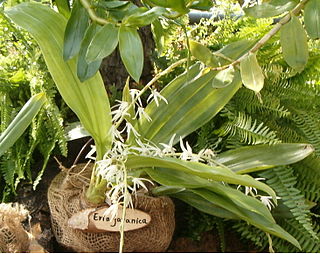
Eria is a genus of orchids with more than 50 species distributed in China, the Himalayas, the Indian Subcontinent, Southeast Asia, New Guinea, Polynesia, Melanesia and Micronesia.
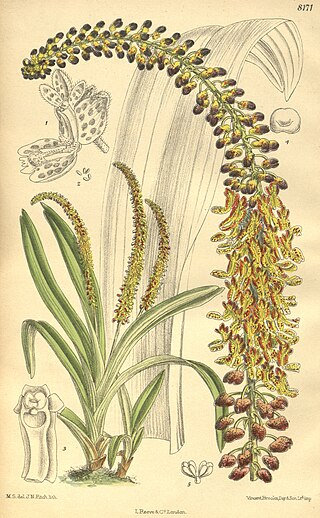
Mycaranthes is a genus of orchids. It was previously considered as a synonym of the genus Eria, but eventually it has become an accepted name. Its species are native to Southeast Asia, China, the Himalayas and New Guinea.

Pinalia, commonly known as gremlin orchids, is a genus of flowering plants in the family Orchidaceae. Orchids in this genus are large epiphytic or lithophytic plants with prominent pseudobulbs, each with up to three thin, flat leaves and cup-shaped, relatively short-lived flowers with scale-like brown hairs on the outside. There are about 120 species occurring from tropical to subtropical Asia to the south-west Pacific.

Pinalia bractescens is a species of orchid.

Pinalia elata is a species of orchid found in Peninsular Malaysia.
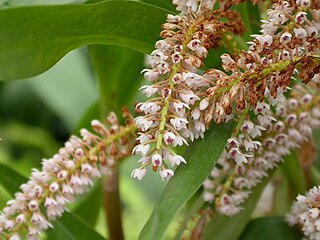
Pinalia multiflora is a species of orchid found in Java, the Lesser Sunda Islands and Sumatra.

Pinalia spicata is a species of orchid.

The Eriinae form a subtribe of Podochileae, a tribe of the orchid family (Orchidaceae). The name is derived from the genus Eria.

Pinalia ovata is a species of orchid found from the Ryukyu Islands and Taiwan to the Philippines. It is an epiphyte that is found growing from 500 to 2,550 meters elevation. This species is erect and sympodial with pseudobulbs of 20 cm long by 1.2 cm diameter. It has about 4 leaves that are linear-oblong to oblong-lanceolate of 15 cm long and 2.1 cm wide.
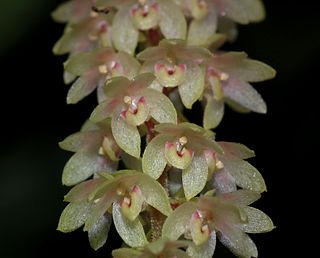
Pinalia polyura, or many-tailed pinalia, is a member of the orchid family endemic to the Philippines. It is semi-pendulous and sympodial, with pseudobulbs that are 20 cm long, 1 cm in diameter, and somewhat club shaped. Each new growth begins halfway along the previous year's pseudobulbs, making the plant longer each year. Each pseudobulb has about 5 shiny, lanceolate leaves approximately 15 cm long and 2 cm wide. Inflorescences appear at the upper portion of the plant and are pendulous, about 10 cm long and bear up to 40 flowers each 1.5 cm in diameter. It grows as an epiphyte and sometimes as a semi-terrestrial plant at elevations to 2,400 meters.

Holarrhena floribunda, commonly known as the false rubber tree, conessi bark or kurchi bark, is a plant in the family Apocynaceae.

Podochileae is an orchid tribe in the subfamily Epidendroideae.
E. floribunda may refer to:
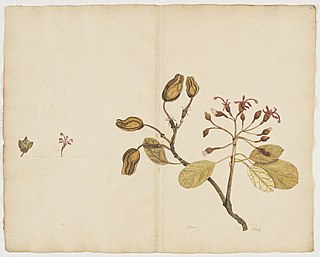
Ungeria is a monotypic genus of flowering plants belonging to the family Malvaceae. It just contains one species, Ungeria floribundaSchott & Endl. It is also in the Helicteroideae subfamily and Helictereae tribe.
Pinalia acutifolia is a species of plant within the orchid family. It is native to the Indian subcontinent.
Pinalia chrysocardium is a species of orchid. It is native to Sumatra. It was reassigned from the genus Eria.


















